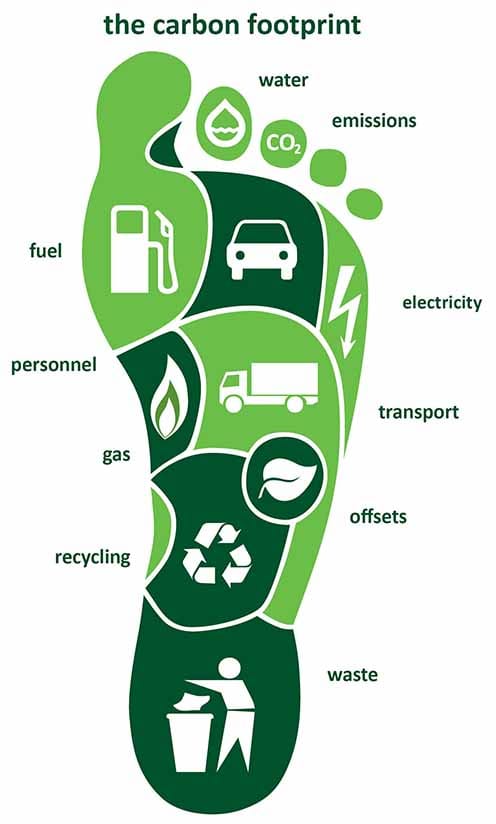Europe's well-known film companies, which produce hundreds of film and TV productions annually, have entered into an unprecedented partnership, aiming to adopt a greener lifestyle for the industry and developing policies to reduce CO2 emissions by adopting sustainable practices for the future workforce.
Eight European countries, including the United Kingdom, France, Spain, Belgium, Romania, Poland, Slovakia, and Sweden, are engaged in a feverish study on how to make the film and TV industry more sustainable and have come together in the Green Screen project under the leadership of Film London. Green Screen, a social and environmental sustainability project funded by Interreg Europe and co-partnered by Film London and Film Paris Région, is a partnership project to reduce the carbon footprint of European film and TV productions that started in 2014 and has yielded great results since then.
When it comes to European cinema, the film industry is a major contributor to economic growth. That's why European countries have signed such a partnership, taking into account sustainability measures in the film industry and implementing policies to reduce CO2 emissions, regardless of large or small-scale productions. In line with Green Screen's mission, sustainability activities that inspire the film industry and lead to a greener lifestyle to minimize harmful environmental impacts are a groundbreaking practice that is taking hold across Europe and beginning to influence the North American film industry.
Every successful Green Screen production emphasizes the importance of the United Nations Sustainable Development Goals of Responsible Consumption and Production and Partnerships for the Goals by reducing waste and energy consumption in London's audiovisual industry, increasing sustainable activities and reducing carbon emissions in film production.



From left to right: The Crown, by Netflix. Image courtesy of IMDB. Quiz by Left Bank Pictures. Image courtesy of TMDB. Everyone's Talking about Jamie, 2021, by Regency Enterprises, Film4 and Warp Films. Image courtesy of IMDB.
Film companies adopt sustainable principles to reduce consumption, increase recycling, and encourage reuse in film and TV productions as part of the program. Within the framework of the action plan created by the European countries, the aim is to implement the best sustainable practices in film productions, reduce CO2 emissions, and implement these policies in the future workforce.
In the three-stage certification launched in 2016 by GreenShoot, a consultancy firm of Film London, which encourages film productions, it is observed that carbon emissions have decreased by 17 per cent in more than 300 productions. These productions achieve success by representing the "green" level, which is the first level in certification. World-known film and TV productions such as Netflix’s The Crown along with shows from Regency Enterprises, Film4, Warp Films, and Left Bank Pictures are deemed worthy of the second level, the "silver" level. Although no production has yet achieved the highest level of "gold," the sustainability activities that have become widespread in the film and TV industry open a hopeful door to the future.
Filmmaking is inherently unsustainable, with high-powered lighting, generators, filming equipment, labour, transportation, etc., leaving a huge carbon footprint for almost every production. Considering the damage the world is experiencing due to global warming, the statistics reveal a frightening truth: every big-budget feature-length production, with its reams of paperwork and travel between locations, has a carbon footprint of nearly 4,000 metric tons. Big-budget productions such as Zoolander 2, Robin Hood: Prince of Thieves, and Ted, with a budget of almost 50 million dollars, produce CO2 equivalents equal to the weight of a giant sequoia tree, which shows that irreversible damage has been caused to nature.
As such, with pioneering initiatives led by the British film industry, leading European production companies and Hollywood actors, producers, and production companies are taking sensible approaches to prevent environmental damage by incorporating Corporate Social Responsibility practices on film sets under the banner of Sustainable film production. Therefore, all kinds of film and TV productions, whether low-budget or big-budget, are taking successful steps to implement sustainable practices in the pre-production, shooting, and post-production stages.
The New Screen Deal: A Route Map To Sustainable Film Production report prepared by the British Film Institute (BFI) on sustainable practices that support environmental restoration and economic prosperity sheds light on a series of systematic changes required to reduce carbon emissions in film productions. In the guidelines, the BFI encourages its staff, producers, and set workers in the UK film industry to adopt environmentally ethical practices, addressing everyday but long-term sustainable practices such as providing renewable energy in both its offices and studios, maintaining a zero waste policy, and introducing energy-efficient dryers to replace the use of paper towels.
The BFI has partnered with BAFTA's Albert Initiative and Arup, the world's leading engineering and design consultancy, on a major mission to unite the global film industry, including UK and European cinema and the North American film market, to create a positive environmental impact and a sustainable future.
The report, New Screen Deal, includes recommendations for film and TV studios, incentives for innovation models for using electric generators on film sets, and sustainable efforts. The report begins with measuring the environmental impact of the film industry and concludes with six principles describing the efficient infrastructure to be established in studio facilities.
When Arup analyzed sustainability data across the entire production process of more than 19 productions shot in the U.K. and the U.S. to produce the report, he came to the frightening conclusion that 2,840 tons of carbon emissions had been emitted. Considering that this CO2 emission is the equivalent of flying from London to New York 150 times, or that the carbon footprint caused by accommodation during one production process alone is equivalent to the electricity used by almost 34 homes for a year, it is an encouraging initiative for sustainability activities in the film industry.
BFI and BAFTA's Albert Initiative aims to unite the film industries, create a positive environmental impact, and inspire audiences to take action for a sustainable future. They achieve these goals by developing the Albert certification system, which allows films to be rewarded. At this stage, it is intended that every film that completes the Carbon Action Plan will be awarded in various categories as one, two, or three stars and will be entitled to receive the Albert certification. If they achieve this, the Albert logo is planned to appear in the ending panel of the film. The 2019 blockbuster film 1917 became the first big-budget United Kingdom film to achieve this certification.
"Commissioned last year, the purpose of this report by Arup was to share innovation and knowledge and help kick-start a more sustainable production ecosystem," said Harriet Finney, BFI Director of External Affairs, emphasizing the importance of sustainable film practices.
"Arriving now—just as productions restart and introduce new ways of working on set and location—there is an opportunity to consider how we create efficiencies in our approach to materials and resources and learn how innovation is working for other industries. This piece of work is not the solution to delivering greater environmental sustainability, but it provides us with a valuable route map for taking forward positive action."
Just like the carbon footprints that Europe's film industry leaves on nature, the film and TV industry of America and Canada, known as the North American film market, produced nearly 450 films in 2023, but considering that it produced at least 700 films and 500 television series every year before the COVID-19 pandemic, it is obvious that the dimensions of the environmental impact of productions are quite high. The North American film market, home to award-winning blockbuster productions and global hit TV productions, spends millions of dollars on food for the cast and set workers, tons of script paper, fuel for generators, and electricity for set lights.
For this reason, major film companies such as Amazon Studios, Disney, NBC Universal, Netflix and Sony Pictures Entertainment, which strive to implement sustainable film production activities, are entering into a major partnership by establishing the Sustainable Production Alliance to reduce the damage to the environment. The Producers Guild of America and the Green Production Guide also lead the way with the guides they have prepared for these large production companies that want to engage in activities to reduce carbon emissions on film sets.


Route Map to Sustainable Film Production. The research highlights five key areas of opportunity for transformation by ARUP, BFI, and Albert. Image courtesy of ARUP. Carbon Footprints. Earth Week 2023 by AirTech International Inc. Image courtesy of AirTech International Inc.
These production companies are on a mission to work towards reducing CO2 emissions, basing their current and future workforces on sustainable filmmaking protocols, as they have done with big-budget blockbusters and TV productions such as The Amazing Spiderman 2, Girls Trip, Madam Secretary, The Post and Divorce.
For example, Netflix, which has produced some of the most acclaimed productions in recent years, is just one company that has set a target to reduce internal emissions by 45 per cent.
Meanwhile, NBC Universal, which has created a visual guide to the best practices of sustainable production, has set a goal of carbon neutrality for all film productions by 2035. Taking action to realize this goal, NBCUniversal has prepared infographics describing the most appropriate sustainable production practices to minimize environmental damage on film sets and studios, including the production office, stage construction mill, and on-site shooting areas. Accordingly, it provides filmmakers, cast, and set workers with educational information on energy efficiency, water conservation, responsible waste management, and sustainable materials and encourages them to put these activities into practice. The infographics are applied to more than 60 productions each year by Universal Pictures, Focus Properties, Universal Television, and Universal Cable Productions.
In addition, Sony Pictures Entertainment, which is engaged in a major effort to leave no worldwide carbon footprint on any of its film productions, is another company that has set sustainable production goals by 2050.
The eight European countries that are members of the European Film Agencies (EFAD) and are implementing the goals of the Green Screen project in their film and TV productions support the change towards a more sustainable future and act under a common roof to provide useful resources to the film industry.
When it comes to sustainable filmmaking, many environmental operations aimed at reducing CO2 emissions have become part of the film and TV industry. Therefore, the need for sustainability in the film industry is an issue that cannot be ignored. Every sustainable activity carried out under the leadership of large production companies that have entered into various alliances around the world not only increases long-term economic and social performance but also minimizes the damage to nature from the environmental improvements implemented so far. As such, sustainability in the film and TV industry sheds light on a promising future.
